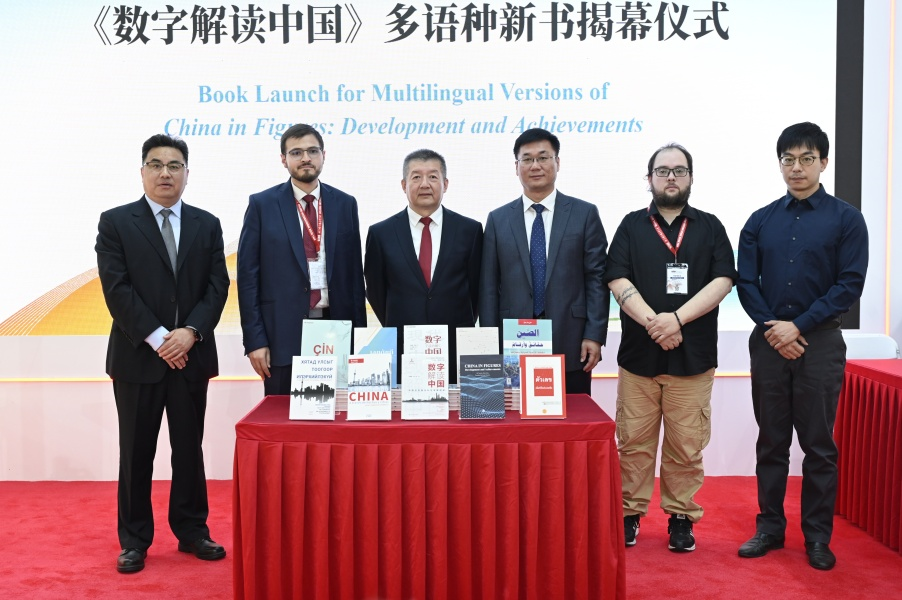On the morning of June 19, 2025, the “AI and the Construction of Global Academic Community – Symposium on International Communication of Chinese Culture” jointly organized by China Renmin University Press, the Belt and Road Publishing Cooperative, and the Center for the Global Promotion of Chinese Culture was successfully held in 2025 BIBF.
He Yaomin, EX-Vice President and Wu Yuzhang Distinguished Chair Professor, Renmin University of China, Li Yongqiang, Chairman of the Board, China Renmin University Press, Xie Fusheng, Editor-in-Chief of China Renmin University Press, Wan Anlun, Head of the National Publishing Discipline Development Expert Group and Professor at Beijing Normal University, Huang Yongjun, General Manager of Veritas & Mercurius Publishing Ltd., Tong Genxing, Deputy Editor-in-Chief of Social Sciences Academic Press (China), Yi Long, Executive Dean of the Publishing Research Institute, Central South University, Adam Marszalek, President of Marszalek Publishing Group, Biimyrza uulu Aziz, President of the “Manas” National Academy, Abdyldajan Akmataliev, Director of the Chyngyz Aitmatov Institute of Language and Literature under the National Academy of Sciences of the Kyrgyz Republic, Deniz Kizilcec, Editor-in-Chief of Caunt Publishing International, Iskanda, Editor-in-Chief of Silk Road Publishing House, Samir El Khatib, Gulf Manager of Digital Future, Juan Merlo Sotillo, Professor of Architecture, Central University of Venezuela (Universidad Central de Venezuela), and scholars and publishers from China and abroad attended the symposium.

During the symposium, Chinese and international publishers explored ways to construct a global academic community in the AI era and strategies to promote Chinese culture worldwide through publishing.

Chairman Li Yongqiang noted that artificial intelligence, as the most transformative technological force in today’s world, is profoundly reshaping our professional and personal spheres. He analyzed from three perspectives: AI technology trends, industry applications and challenges, and pathways for international collaboration. Specifically, he advocated for leveraging the Belt & Road Publishing Cooperative as a mechanism and platform for international publishing cooperation in the AI era. By actively embracing new technologies and exploring AI applications in publishing alongside global publishing partners, he proposed to jointly build a more open, inclusive, innovative, and efficient global academic community, thereby strengthening scholarly exchanges and cultural dissemination worldwide through publishing.

Adam Marszalek said that artificial intelligence is profoundly transforming the field of academic publishing, bringing new opportunities for knowledge creation and dissemination. Marszalek Publishing Group stands ready to collaborate with Chinese and global partners to promote inclusive knowledge sharing through technology and collective values.

Biimyrza uulu Aziz emphasized that artificial intelligence is fundamentally reshaping cultural dissemination. The “Manas” National Academy was eager to collaborate with institutions like China Renmin University Press on multilingual publishing projects, aiming to deepen cultural exchanges between China and Kyrgyzstan.

Tong Genxing mentioned that, through the multilingual publishing project of Chinese Modernization Research Series and its building of intelligent database, Social Sciences Academic Press (SSAP) employs generative AI technologies to systematically synthesize China’s modernization practices and experiences.

Deniz Kizilcec shared AI implementations in academic publishing. On behalf of the Caunt Publishing International, he expressed keen interest in collaborating with experienced industry peers to further explore AI’s potential.

Iskanda said that as a member of the Belt & Road Publishing Cooperative, Silk Road Publishing House has effectively promoted Chinese publications in Central Asian markets through its “AI-assisted translation + Human editor” model.

Huang Yongjun emphasized that AI is profoundly transforming the international dissemination model of Chinese culture, as AI technologies have been successfully applied across multiple domains, including content creation, translation efficiency enhancement, and multimodal presentation, significantly reducing obstacles to cultural exchange.

Samir El Khatib said that artificial intelligence is radically reshaping the fields of education, research, and publishing.

He Yaomin noted that the accelerated development of artificial intelligence has enabled China to cultivate globally competitive large-model ecosystems exemplified by DeepSeek. While AI technology presents opportunities, it also exacerbates the digital divide between developed and developing countries. To address this, China will leverage cooperative platforms such as the Belt & Road Publishing Cooperative to transform AI technology into a “vessel of civilization, peace, and development” for global progress, empowering developing countries to bridge the digital gap and achieve collective prosperity.

The symposium culminated with all attendees who observed the launch ceremony of the multilingual versions of China in Figures: Development and Achievements.
First review: Zang Yiming
Second review: Liu Guangyu
Final review: Guo Xiaoming